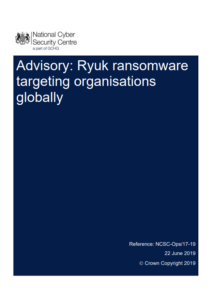The US Coast Guard issued a bulletin to inform the maritime community of a recent incident involving a ransomware intrusion at a Maritime Transportation Security Act (MTSA)-regulated facility. Research is currently ongoing, but the virus, identified as “Ryuk” ransomware, may have entered the network of the MTSA facility via an email phishing campaign.
Once the embedded malicious link in the email was clicked by an employee, the ransomware allowed for a threat actor to access significant enterprise Information Technology (IT) network files, and encrypt them, preventing the facility’s access to critical files,
…the USCG explained.
The virus further burrowed into the industrial control systems that monitor and control cargo transfer and encrypted files critical to process operations.
The impacts to the facility included a disruption of the entire corporate IT network (beyond the footprint of the facility), disruption of camera and physical access control systems, and loss of critical process control monitoring systems.
These combined effects required the company to shut down the primary operations of the facility for over 30 hours while a cyber-incident response was conducted.
At a minimum, the following measures may have prevented or limited the breach and decreased the time for recovery:
- Intrusion Detection and Intrusion Prevention Systems to monitor real-time network traffic
- Industry standard and up to date virus detection software
- Centralized and monitored host and server logging
- Network segmentation to prevent IT systems from accessing the Operational Technology (OT) environment
- Up-to-date IT/OT network diagrams
- Consistent backups of all critical files and software
About Ryuk
Ryuk was first seen in August 2018 and has been responsible for multiple attacks globally. Ryuk is a targeted ransomware where demands are set according to the victim’s perceived ability to pay.
The Ryuk ransomware is often not observed until a period of time after the initial infection – ranging from days to months – which allows the actor time to carry out reconnaissance inside an infected network, identifying and targeting critical network systems and therefore maximising the impact of the attack. 1 But it may also offer the potential to mitigate against a ransomware attack before it occurs, if the initial infection is detected and remedied.
Ryuk is a persistent infection. The malware’s installer will attempt to stop certain antimalware software and install the appropriate version of Ryuk depending on a system’s architecture.
The Ryuk ransomware itself does not contain the ability to move laterally within a network, hence the reliance on access via a primary infection, but it does however have the ability to enumerate network shares and encrypt those it can access.
This, coupled with the ransomware’s use of anti-forensic recovery techniques (such as manipulating the virtual shadow copy), is a technique to make recovering from backups difficult.
All non-executable files across the system will be encrypted and will be renamed with the .ryk file extension. A ransom note will be dropped in each processed folder with the name RyukReadMe (.html or .txt).
Recommendations
As a result from the incident, the USCG recommends:
- Facilities to utilize the National Institute of Standards and Technology (NIST) Cybersecurity Framework (CSF) and NIST Special Publication 800-82 when implementing a Cyber Risk Management Program.
- Maritime stakeholders to verify the validity of the email sender prior to responding to or opening any unsolicited email messages.
- Facility owners and operators continue to evaluate their cyber security defense measures to reduce the effect of a cyber-attack.
As a reminder, suspicious activity and breaches of security, including breaches of telecommunications equipment, including computer, system and network security measures which support functions described in the facility security plan or could contribute to a Transportation Security Incident (TSI), must be reported to the National Response Center (NRC) at (800) 424-8802.
For additional guidance on the defining and reporting of cyber incidents refer to CG-5P Policy Letter 08-16, “Reporting Suspicious Activity and Breaches of Security.”
The Coast Guard encourages companies and their facilities to remain vigilant in the identification and prompt reporting of suspicious cyber-related activities. Questions pertaining to this bulletin may be directed to the Coast Guard Office of Port & Facility Compliance’s Domestic Ports Division (CG-FAC1) at (202) 372-1109.
Cyber threat has been identified as a key area of concern for shipping in the last years, especially on the aftermath of the NotPetya attack breaching the systems of Danish shipping giant Maersk in June 2017.
Find out more risk mitigation measures in the following Advisory by UK National Cyber Security Center:































































